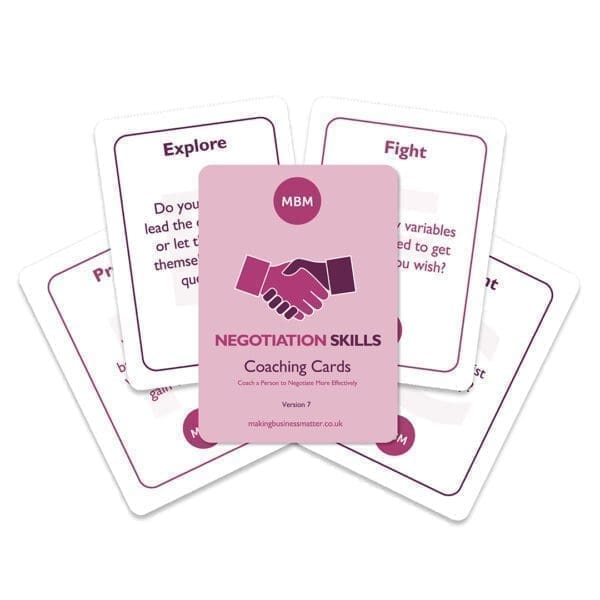Wielding Tactical Bargaining in the Business Arena
In the fast-paced realm of business and work, where opportunities and challenges abound, negotiation skills have become the lifeblood of success. Whether you’re a seasoned leader steering a company through turbulent waters or an employee striving for career advancement, mastering the art of strategic negotiation is the key that unlocks doors to triumph.
Picture this: a dynamic negotiation table, filled with anticipation and intrigue, where leaders and employees engage in a dance of strategy, communication, and persuasion. Each participant is armed with a unique set of goals, aspirations, and interests, aiming to secure favourable outcomes and forge prosperous partnerships. In short, this is the battlefield where deals are made, conflicts are resolved, and innovation thrives.
But what does it take to emerge victorious in this complex dance? How can leaders navigate the intricate web of relationships and aspirations while empowering their employees to negotiate with finesse? Join us as we embark on a journey into the realm of strategic negotiation, where savvy tactics, emotional intelligence, and collaborative spirit intertwine to drive business success.
In this article, we will explore the fundamental principles of strategic negotiation and delve into practical strategies tailored for both leaders and employees. From understanding the importance of negotiation in the workplace to overcoming common challenges and building strong relationships, we will equip you with the tools and insights necessary to negotiate your way to victory.

Definition and Significance of Strategic Negotiation
Strategic negotiation refers to the process of planning, executing, and managing negotiations with a purposeful approach. Specifically, it involves analysing the interests, goals, and motivations of all parties involved to reach mutually satisfactory agreements. Even more, in business and work environments, where conflicts, deals, and collaborations are constant, strategic negotiation is crucial for maintaining balance, resolving disputes, and fostering productive relationships.
What Are the 4 Negotiation Strategies?
#1- Collaborative Negotiation: Fostering Win-win Solutions
Collaborative negotiation is all about finding common ground and creating win-win solutions that satisfy the interests of both parties involved. By adopting a cooperative mindset and actively seeking shared objectives, you can unlock a world of opportunities for mutual benefit. Through open communication, active listening, and brainstorming creative alternatives, collaborative negotiation fosters long-term relationships built on trust and cooperation.
Sticky Learning ® is 7 times more effective than 1-day training courses. Plus, you will get a Chain of Evidence proving your Return on Investment. Discover soft skills training that changes behaviours long term.

#2- Competitive Negotiation: Asserting Your Position
Competitive negotiation, often employed in high-stakes scenarios, involves asserting your position and maximising your own gains. Also, this strategy is characterised by a more assertive approach, leveraging your strengths, and utilising sources of power to influence the negotiation outcome. While competitive negotiation may involve some degree of conflict, it aims to secure the best possible deal for yourself or your organisation by emphasising your unique value proposition.
#3- Compromising Negotiation: Finding Middle Ground
In certain situations, compromise becomes a viable strategy for reaching a mutually acceptable agreement. Basically, compromising negotiation involves a give-and-take approach, where both parties make concessions to meet halfway. This strategy acknowledges that not all objectives can be fully achieved but emphasises the importance of finding common ground and maintaining a cooperative atmosphere. Compromising negotiation is particularly useful when time constraints or limited resources call for swift resolutions.
#4- Accommodating Negotiation: Preserving Relationships
Accommodating negotiation focuses on preserving relationships and prioritising the interests of the other party. In essence, this strategy involves making concessions and displaying flexibility to meet the needs and desires of the opposing party. Accommodating negotiation can be employed when maintaining long-term relationships, goodwill, or reputation is of utmost importance. While it may involve sacrificing some immediate gains, it lays the foundation for future collaboration and fosters goodwill between parties.


>> Negotiation Skills Coaching Cards <<
Benefits of Effective Negotiation Skills
Effective negotiation skills yield numerous advantages for both leaders and employees. In fact, leaders who possess strong negotiation abilities can secure profitable deals, establish strategic partnerships, and navigate complex business landscapes with confidence. On the other hand, employees equipped with negotiation skills can advocate for their needs, achieve career growth, and contribute to successful collaborations within teams. Improved negotiation skills enhance communication, problem-solving, and decision-making abilities, enabling individuals to thrive in competitive environments.
Contribution of Strategic Negotiation to Business Objectives
Strategic negotiation is a key driver in achieving business objectives. By employing a thoughtful and well-executed negotiation strategy, leaders can secure favourable contracts, favourable terms, and strategic alliances. On the same note, effective negotiation ensures that businesses maximise value, minimise risks, and maintain a competitive edge in the market. Additionally, negotiation skills empower leaders to resolve conflicts efficiently, foster a positive work culture, and motivate employees towards shared goals, ultimately contributing to the overall success of the organisation.
Key Principles of Strategic Negotiation: Building Blocks for Success

1) Identifying and Leveraging Common Interests During Negotiations:
Successful negotiations involve identifying and leveraging common interests among all parties involved. By focusing on shared objectives and mutually beneficial outcomes, negotiators can create value and build strong foundations for collaboration. Furthermore, recognising and aligning common interests not only fosters cooperation but also paves the way for win-win solutions that satisfy all stakeholders.
2) Balancing Assertiveness and Cooperation for Successful Outcomes:
Achieving successful outcomes in negotiations requires a delicate balance between assertiveness and cooperation. While assertiveness allows negotiators to advocate for their interests and goals, cooperation fosters a collaborative and harmonious environment. By maintaining this delicate equilibrium, negotiators can navigate discussions with confidence, assert their positions effectively, and foster an atmosphere conducive to constructive dialogue and compromise.
3) The Importance of Active Listening and Empathy in Negotiation:
Active listening and empathy are essential components of effective negotiation. By actively listening to the concerns, needs, and perspectives of the other party, negotiators gain valuable insights that inform their strategies and proposals. Additionally, practising empathy enables negotiators to understand and appreciate the emotions and motivations of all parties involved. This understanding facilitates effective communication, builds rapport, and helps in finding mutually beneficial solutions.
Developing Effective Negotiation Strategies

#1. Setting Clear Goals and Objectives Before Entering Negotiations:
Before engaging in negotiations, it is crucial to set clear goals and objectives. This involves defining what you aim to achieve and the desired outcomes. By establishing a clear direction, negotiators can focus their efforts and develop strategies that align with their goals. Clear goals provide a framework for decision-making and guide the negotiation process towards success.
#2. Analysing and Understanding the Other Party’s Interests and Motivations:
To develop effective negotiation strategies, it is essential to analyse and understand the interests and motivations of the other party. By gaining insights into their needs, desires, and concerns, negotiators can tailor their approach and proposals to resonate with the other party’s priorities. This understanding allows for the identification of common ground and the exploration of mutually beneficial solutions.
#3. Identifying and Utilising Sources of Power and Leverage in Strategic Negotiations:
Negotiations involve the dynamic of power and leverage. It is crucial to identify and utilise sources of power to influence the negotiation process positively. These sources can include expertise, alternative options, relationships, or access to valuable resources. By strategically leveraging these sources, negotiators can strengthen their position and negotiate from a position of advantage, increasing the likelihood of achieving favourable outcomes.
#4. Adapting Strategies and Flexibility in Negotiations:
Effective negotiation strategies require adaptability and flexibility. Negotiators must be prepared to adjust their approach based on the evolving dynamics of the negotiation process. This may involve revisiting goals, exploring alternative solutions, or reconsidering tactics to address changing circumstances. By remaining adaptable and open-minded, negotiators can seize opportunities, overcome challenges, and navigate towards successful outcomes.
Negotiating for Win-win Outcomes: Fostering Mutually Beneficial Agreements

1. Strategies for Expanding the Value of the Negotiation Beyond Initial Expectations:
To maximise the value of a negotiation, it is important to consider strategies for expanding the benefits beyond the initial expectations. This can be achieved by exploring additional opportunities for cooperation, such as joint ventures, partnerships, or resource sharing. By thinking creatively and considering potential synergies, negotiators can unlock additional value that goes beyond the immediate scope of the negotiation.
2. Ensuring Long-term Satisfaction and Cooperation After the Negotiation:
Securing long-term satisfaction and cooperation requires careful consideration even after the negotiation is concluded. This involves fulfilling commitments made during the negotiation, maintaining open lines of communication, and addressing any concerns or issues that may arise. By nurturing ongoing relationships and demonstrating a commitment to collaboration, negotiators can lay the foundation for continued success and future negotiations.
3. Emphasising Fairness and Equitable Outcomes:
In negotiating for win-win outcomes, it is crucial to emphasise fairness and equitable outcomes. This involves considering the interests and needs of all parties involved and striving for balanced agreements. By focusing on fairness, negotiators build trust and goodwill, increasing the likelihood of long-term satisfaction, cooperation, and the potential for future collaborations.
Overcoming Common Challenges in Strategic Negotiations: Navigating Obstacles With Confidence
1. Dealing With Resistance and Objections During Negotiations:
Negotiations often involve resistance and objections from the other party. When faced with these challenges, it is important to approach them with a problem-solving mindset. By actively listening, addressing concerns, and exploring alternative options, negotiators can work towards resolving conflicts and finding mutually acceptable solutions. Building rapport, seeking common ground, and emphasising the value of collaboration can help overcome resistance and objections effectively.
2. Managing Emotions and Maintaining Composure in High-pressure Situations:
Negotiations can be intense and emotionally charged, particularly in high-pressure situations. It is crucial to manage emotions and maintain composure to make rational decisions. Taking a step back, practising deep breathing, and focusing on the facts can help regain control. By staying calm and composed, negotiators can better analyse the situation, communicate effectively, and navigate towards successful outcomes.
3. Strategies for Finding Creative Solutions When Faced With Impasses:
Impasses and deadlocks are common challenges in negotiations. To overcome these hurdles, it is important to employ strategies that encourage creativity and innovative thinking. This may involve brainstorming new ideas, exploring different perspectives, or involving neutral third parties to facilitate discussions. By thinking outside the box and being open to alternative approaches, negotiators can break through impasses and find creative solutions that satisfy all parties involved.
4. Building Bridges and Maintaining Positive Relationships:
Even in challenging negotiations, it is essential to prioritise building bridges and maintaining positive relationships. Effective communication, respect, and active listening are key to fostering a constructive atmosphere. By focusing on long-term relationships rather than short-term gains, negotiators can lay the foundation for future collaborations and minimise the negative impact of current challenges. Keeping the lines of communication open and seeking common goals can help overcome obstacles and build lasting partnerships.
Negotiation Skills for Leaders: Empowering Successful Team Negotiations

1. The Role of Leaders in Facilitating Successful Strategic Negotiations Within Teams:
Leaders play a crucial role in facilitating successful strategic negotiations within teams. They provide guidance, establish clear objectives, and ensure effective communication among team members. By fostering a collaborative and inclusive environment, leaders empower team members to voice their opinions, contribute ideas, and actively participate in negotiations. Strong leadership skills set the tone for constructive discussions and lay the foundation for achieving positive outcomes.
2. Developing a Strategic Negotiation Culture and Promoting Constructive Dialogue:
Leaders can contribute to a positive negotiation culture by promoting constructive dialogue and encouraging open communication within the team. They establish norms that prioritise active listening, respect for diverse perspectives, and the exploration of win-win solutions. By creating an environment that values collaboration and problem-solving, leaders cultivate a negotiation culture that supports successful outcomes and enhances team dynamics.
3. Coaching and Training Employees to Improve Their Strategic Negotiation Skills:
Leaders have the responsibility to coach and train employees to improve their strategic negotiation skills. This involves providing guidance, sharing best practices, and offering development opportunities to enhance negotiation competencies. Through workshops, mentoring, or role-playing exercises, leaders can equip their team members with the necessary tools and techniques to negotiate effectively. By investing in employee growth, leaders empower individuals to negotiate with confidence and contribute to the team’s overall success.
4. Leveraging Strategic Negotiation Skills for Organisational Success:
Leaders who possess strong strategic negotiation skills can leverage them to drive organisational success. By effectively negotiating with external stakeholders, such as clients, suppliers, or partners, leaders can secure favourable deals, establish strategic alliances, and maximise value for the organisation. Additionally, strong negotiation skills enable leaders to resolve conflicts, foster positive relationships, and create a culture of collaboration within the broader business context.
Negotiation Skills for Employees: Unlocking Career Advancement

#1- The Importance of Negotiation Skills for Individual Career Growth:
Strategic negotiation skills are essential for individual career growth. They empower employees to advocate for themselves, seize opportunities, and navigate professional challenges. By honing negotiation skills, employees can effectively communicate their value, secure desirable assignments, and negotiate for career advancement opportunities. Strong negotiation skills enable employees to shape their own career paths and unlock new possibilities.
#2- Strategies for Negotiating Salary, Promotions, and Benefits:
Employees can leverage strategic negotiation skills to negotiate favourable salary packages, promotions, and benefits. By conducting thorough research, articulating their achievements, and demonstrating the value they bring to the organisation, employees can make compelling cases for deserved salary increases and promotions. Negotiation skills also enable employees to discuss and secure additional benefits or flexible work arrangements that enhance their work-life balance.
#3- Applying Negotiation Skills in Day-to-day Interactions:
Strategic negotiation skills are not limited to formal negotiation scenarios; they are valuable in day-to-day interactions with colleagues and clients. Specifically, effective negotiation skills enable employees to navigate conflicts, manage expectations, and find mutually agreeable solutions. By actively listening, seeking common ground, and fostering open communication, employees can build positive relationships, resolve disputes, and enhance collaboration in the workplace.
#4- Continuous Development and Application of Negotiation Skills:
To maximise the benefits of strategic negotiation skills, employees should continuously develop and apply them in various professional contexts. This can be achieved through participation in workshops, reading relevant resources, or seeking mentorship opportunities. By actively seeking opportunities to practice negotiation skills, employees can refine their abilities, gain confidence, and continually improve their negotiation effectiveness.
Conclusion
In conclusion, strategic negotiation skills are essential for both leaders and employees in the business and work environment. By understanding the importance of strategic negotiation, individuals can develop effective negotiation strategies, overcome common challenges, and achieve win-win outcomes. Whether it’s fostering collaboration, managing resistance, or finding creative solutions, negotiation skills empower individuals to navigate complex situations, drive career advancement, and foster positive relationships. By continuously honing these skills and applying them in real-life scenarios, individuals can unlock opportunities, maximise value, and contribute to their personal and organisational success.
We’re on Instagram. Follow us!




